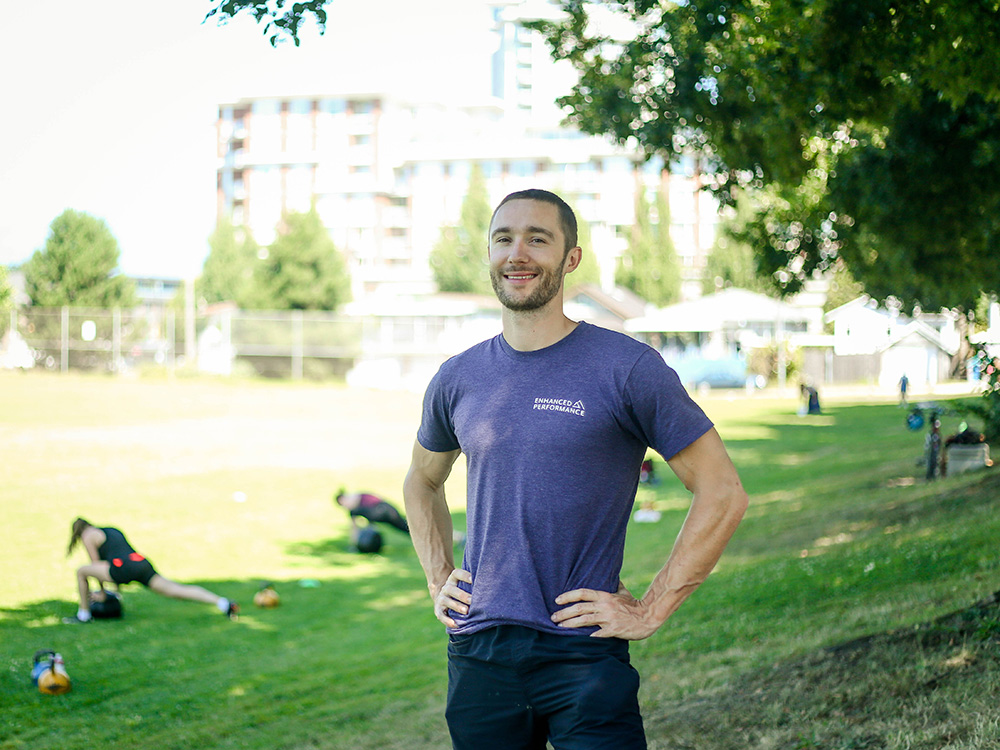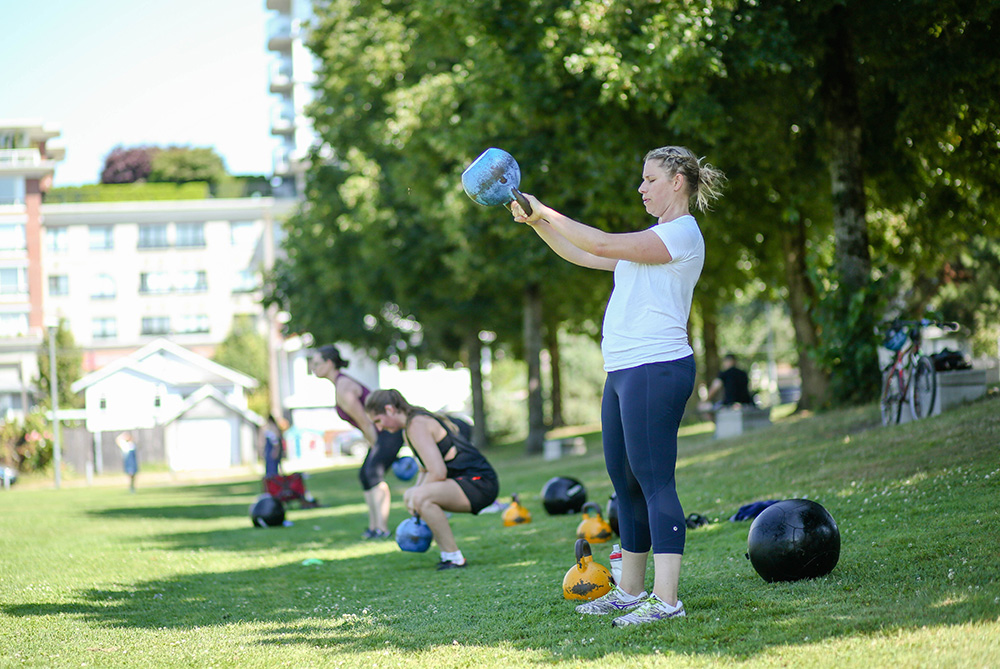As a fitness professional since age 15, Cian Lanigan has been training for a future in athletics most of his life. But there was no preparing for the fast-paced industry changes brought on by the coronavirus pandemic. “It definitely came in out of left field,” he said.
Lanigan is the co-owner with his wife Lynne Laporte of Enhanced Performance, a gym that saw a 50 per cent drop in revenue in the wake of COVID-19 closures. The 30-year-old was already planning an online training platform to offer coaching services this September, but the pandemic pushed his team to pivot quickly in March.
Enhanced Performance, like many other gyms and athletic studios across Canada, transitioned online during British Columbia’s strictest phase of lockdown, which meant cutting fees and losing members.
“Before COVID-19, we had 150 members, all paying our monthly membership somewhere around $200 a month,” he said. “When we switched to our online membership, we only charged $99 per month, because that’s a competitive price point for online training.”
Lanigan is grateful to his members, some of whom continued to pay the old membership fee.
“There were members who maintained paying their full amount, even during our gym closure, with the simple desire to support us. Honestly, that got us through that initial period and it really saved us.”
Now that gyms are starting to reopen, owners like Lanigan have to make tough decisions about online and in-person classes. “Before the pandemic, we ran 76 classes per week in the gym. We are currently just running 12 classes in the gym. You can only imagine how that affects our bottom dollar,” said Lanigan.
With new cleaning protocols and uncertainty about the months ahead, owners are now wondering if some of the transformations could become permanent.
Tammy Morris, the founder of Tantra Fitness, a pole dancing and aerial studio, says she’s lost at least 30 per cent of her members. “Our revenue has absolutely gone down and our expenses have gone up,” said Morris.
Because of their unique classes, the cleaning procedures have been expensive. All the poles have to be wiped down with Lysol after every class, adding to staffing costs.
When Morris started Tantra with one tiny little studio at Cook Street in Olympic Village in 2004, she didn’t anticipate any of the changes brought on by the pandemic.
“We’ve been through a lot, from the construction around the Olympics to the limited access to our building when the SkyTrain routes were being made. We even made it through when our building got demolished, but COVID-19 has been the worst of all. It brought it all to a halt.”
Morris has found members’ reactions to the pandemic hard to predict. “Some people are just not comfortable to come back, but then we’re also dealing with the people that are like, ‘I don’t want to wear a mask when I’m working out on a pole.’ So, we’ve lost members who don’t want to wear a mask.”

Like Morris, Lanigan has also been losing out on time. The gym is mopped, and all equipment is sanitized, which amounts to almost an hour of time without any activity in the space. This pushed Lanigan and his team to get creative with scheduling and outdoor training.
“We are unable to service our whole membership base in the gym, so we’re only allowing our members to come into the gym once a week, but we are also providing park workouts, as the second workout a week, and the third training session is at home, via Zoom and our app.”
To avoid people breathing heavily in the gym, Lanigan says all the hard training is kept for the park or online classes. Through Enhanced Performance’s strength and conditioning app, members can watch recorded videos of exercises and demonstrations with key coaching points. Members could also submit videos to coaches for feedback.
Similarly, Morris has been providing tutorial classes and it has been successful for Tantra Fitness.
“Our online classes are busier than our in-studio classes,” she said. “But most of our classes we offer online are without a pole, so we offer dancers conditioning, stretch, contortion classes; splits ability classes, erotica classes, lap dance classes; but we just offer [them] in a way that people can take without having that type of equipment.”
Though a few members have poles in their home settings, not many members have the ability to hook up silks or hoops in their homes. Such constraints have caused Tantra not to offer high-end classes like aerial classes, which again has impacted their revenue.
“One of the biggest changes is that we are unable to offer a lot of our higher-level classes since we can’t spot people and can’t touch them. It’s really frustrating for people who want to move forward but can’t, because we aren’t allowing them to jump levels at this time for their own safety.”
Morris started Tantra tutorials 10 years ago and believes online classes are the only way ahead. Likewise, Lanigan has been finding online classes to be useful, especially when it comes to people with disabilities.
“Our online training is with bodyweight modifications and our two members, both with upper-limb limitations, have been finding it easier. When we do something pulling related, like a deadlift or a chain, it is challenging because it pulls on their prosthetic limb, but an online home-based session where they’re using their own bodyweight is easier.”
Lanigan also reckons there are disadvantages to the online transition. “I think the major disadvantage of switching online is that it limits the ability for members who might be looking to build social connections in the gym with their peers.”
This is the core value of their inclusive culture, he said, noting for queer clients, or those who’ve traditionally felt uncomfortable in the gym, those interactions were important. “Before, while resting between exercises or at the end of their workout, members would chat to the other people in the class, and I think that that aspect has been taken away.”
Online members are not necessarily consistent in their workouts, according to Lanigan.
“Many members slowly started to decrease their training because they gradually lost motivation,” he said. “When members are exclusively doing online training sessions and nothing in person, I find the majority of people start to lose motivation.”
But that’s not the only cause of worry for Lanigan. His team is not sure how they would operate in the fall, with ongoing speculations of a second wave of COVID-19 cases.
“I think the real telling time is going to be over the winter months when the subsidy programs start drying up. Come the fall, we won’t be able to go to the park anymore because of the weather. With potential lockdown, and inability to go outdoors, it will be a constraint on our business.”
Government assistance programs like rent relief and wage subsidy came in handy to small businesses. Both Lanigan and Morris say it’s kept them afloat in the past months.
“I always like to be an optimist,” said Morris. “What we at Tantra Fitness are more worried about than a potential lockdown is losing more members. Hopefully, five years from now, I will look back and just say that it was a rough one, but we made it.”
Lanigan is working on member retention by fostering a team atmosphere online. He’s aiming to gain 50 to 75 members in the next three months to keep their business afloat.
Lanigan is approaching that through their app, where members can interact over team feed. “It’s almost like a positive snowball effect. When you don’t get to see anyone or you get to see them in a Zoom class only, it’s not the same and you don’t get the same interaction,” he said.
“It’s the social pressure from the coaches and friends that gets one hooked into it, and we are trying to replicate that online.”
Will the online transition be enough to sustain businesses long term? On that point, Lanigan isn’t sure.
“We are trying to carry over the ability of a community and inclusive core culture into our online offerings, but I wonder, will it ever replace the in-person network? I don’t know. But I’m hopeful.” ![]()
Read more: Health, Local Economy, Coronavirus
















Tyee Commenting Guidelines
Comments that violate guidelines risk being deleted, and violations may result in a temporary or permanent user ban. Maintain the spirit of good conversation to stay in the discussion.
*Please note The Tyee is not a forum for spreading misinformation about COVID-19, denying its existence or minimizing its risk to public health.
Do:
Do not: